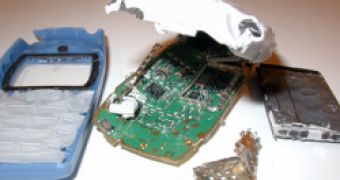Motorola, NEC, Panasonic Mobile Communications and Samsung Electronics have teamed up with operators NTT DoCoMo and Vodafone to work towards a common Linux based mobile platform.
In 1973, Dr. Martin Cooper, working for Motorola, created the world's first portable handset. This was the '70s, remember, so people who bought them are the same people who today buy independently spinning gold-plated hubcaps for their SUV. With spikes.
In the early 1990s, Sun Microsystems created Java and after a brief scuffle with Microsoft managed to keep it clean and unfragmented. The mobile phone industry caught onto this and proceeded to slap java onto their phones, and this created a whole new industry of mobile content publishing.
Initially the marketing buzz was enough, but people started to get bored, then began to get annoyed, and sometimes homicidal when crazy frogs were mentioned.
Pushed primarily by Nokia, Symbian OS seemed promising, but this one's also losing its appeal. I find this inexplicable. Seriously - I don't understand! You don't have to live within the confines of MIDP, and can even use a proper programming language, like C. Perhaps marketing droids got tired of pushing the same sleek name around and began hunting for others.
We're talking operating systems, and so Windows must be mentioned: Microsoft Windows.
Now that they got their mention, let's get on with the news: The aforementioned group of companies say they got tired of software developers keying their cars and stealing decorative plants from their lobbies on account of incompatibilities. They decided to jointly develop a Linux environment, which they could all use on their phones, thus appeasing the slightly antisocial developers, reducing R&D costs and getting some free publicity at the same time.
No details have surfaced, but one can deduce at least this: the result of their work being based on Linux, it'll have to be GPL'ed. The bad news is that they could easily pull a tivo and not allow you to run your own versions, even if the source code is available (see Trusted Computing). On the other hand, they may not.
The other bad news is that even though we might be able to run our own programs, the 'phone' part - the part with the low level goodies will not be accessible because of stupid paranoid cautious legislation.

 14 DAY TRIAL //
14 DAY TRIAL //